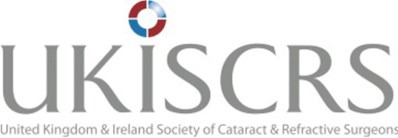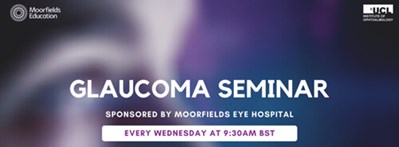1. Alcon Experience Academy
The Alcon Experience Academy ran a non-promotional educational series from 12 May to 23 June 2020. Being mildly biased as a junior trainee, this has to be rated by far the best series due to its organised nature, clear timetable and invaluable educational benefit to junior trainees. All the lectures can be found online for rereview and they explore a wide range of topics, not limited to clinical ophthalmology.

Particular webinar highlights include ‘Research in ophthalmology’ by Mr Mayank Nanavaty on 12 May. This was a fascinating start to the educational series since academic ophthalmology does not always receive the spotlight. Topics such as sources of funding, acquiring ethical approval and research dissemination were debunked by Mr Nanavaty, who has extensive experience in anterior segment research and conducting clinical trials.
On top of this, the difficult topic of optical physics was tackled in a ‘Biometry’ webinar on 21 May, which was delivered by Alcon Clinical Application Specialists: Mr Stian Johansen and Mr David Bolton. There are many technologies employed in ophthalmology and ophthalmologists are not always the best individuals at explaining the theory behind these technologies. In the biometry webinar, the expert hosts provided an in-depth explanation of the various anatomical measurements made to size up the eye, the techniques employed by the machines (e.g. ultrasound or infrared light) and the formulas used to make the intraocular lens calculations. The webinar provided some much-needed explanation of what is typically a tricky topic to understand.
The educational series rounded off with a fantastic webinar on ocular trauma and vitreoretinal (VR) management on 23 June. This is one of the many situations that proves bothersome for ophthalmology trainees on-call due to the complex and multidisciplinary management. Mr Kurt Spiteri-Cornish explained the Birmingham Eye Trauma classification system, and the different types of presentations of open and closed globe injuries, as well as the point at which VR surgeons need to be involved.
2. UKISCRS
In close second, if not joint first with the Alcon Experience Academy, would be the webinar series run by UKISCRS, who are always supportive of professional development and trainee education.

The first webinar was on 9 April with Professor David Spalton kicking off the series with frontline ophthalmology and how to manage things in a COVID-19 era. There was particular emphasis on how the specialty of ophthalmology had been hit by the loss of one of its fellow colleagues, Mr Li Wenliang, which caused a ripple in the community.
Later into the series, insight was provided by various ophthalmology subspecialties and their ability to tackle remote consultation during the COVID-19 pandemic. It was interesting to witness the fact that oculoplastic surgeons were not struggling given the visual nature of their specialty, as outlined by Mr Richard Caeser, whereas other specialties, such as glaucoma and neuro-ophthalmology, as debated by Ms Laura Crawley and Ms Srilakshmi Sharma, relied heavily on an ophthalmic examination and tests. This meant that there was a certain adjustment period for all subspecialties in ophthalmology, but longer for some.
A particular highlight to this series was the joint UKISCRS and RCOphth webinar that tackled the timely topic of ‘Recommencing cataract surgery’ on 19 May. The procedure was initially deemed an aerosol generating procedure, but since then not only have studies disproved this, but a joint scoring tool has been issued to stratify the urgency of a cataract operation. Many units across the UK are now employing this scoring tool to provide urgent operations to individuals who require it the most, poor visual quality needs to be balanced with the risk of COVID-19 infection (e.g. ethnicity and age).
3. Heidelberg Engineering
Similar to the Alcon Experience Academy, Heidelberg – an ophthalmology medical devices company – have run a series of educational webinars during the pandemic. Once again, as a trainee who is new to the specialty of ophthalmology, these webinars have proved an invaluable learning opportunity and are geared to inspire debate, but equally digest core ophthalmology concepts.

The two talks I ‘attended’ by Heidelberg were on ‘COVID-19 Clinical Experience and Impact in Ophthalmology’ and ‘Imaging in Ophthalmic Research 2020’. The first webinar explored the various barriers to maintaining high quality eye care during a pandemic, whilst the second webinar outlined the various studies, both small and large, that are being conducted with unique imaging modalities, such as optical coherence tomography (OCT) and fundus fluorescien angiography (FFA).
The webinar on ‘Imaging in Ophthalmic Research’ proved to be particularly insightful into the latest academic work being conducted in the ophthalmology community. This was held on 23 June and was refreshing since it was a webinar that was trying to replace all the cancelled conferences and for once was not related to COVID-19. Chaired by Mr Balaskas, a Consultant Ophthalmologist at Moorfields, three prominent speakers shared their research interests. This included Dr Montesano, Research Fellow at City University of London, who explored novel methods of assessing the structure-function relationship in age-related macular degeneration (AMD). Dr Heeren explored the use ofretinal imaging in the staging of macular telangiectasia, a cause for central vision loss due to the growth of problematic blood vessels. Finally, the webinar rounded off with how artificial intelligence (AI) technology can be of value in glaucoma by Professor Cordeiro of Imperial College, London.
Read more about this webinar at www.eyenews.uk.com/industry-news/post/catch-up-with-the-heidelberg-engineering-academy-educational-webinars
4. Moorfields Glaucoma Seminars
An educational seminar is run every Wednesday morning, without fail, by leading experts at the Institute of Ophthalmology (IoO), UCL and Moorfields Eye Hospital. This seminar is unique compared to the rest since it provides insight into the latest research and up-to-date clinical practice, there is less emphasis on the education of common eye conditions.

The most memorable webinar from this series has to be the talk by Mr Pearse Keane, a Consultant Ophthalmologist at Moorfields and Associate Professor at the IoO, UCL. His talk on 20 May explored the concept of AI helping to assist ophthalmologists in the diagnosis and prognosis of various retinal disease. The specialty of ophthalmology already has many scans being carried out on a daily basis. His collaboration with Google DeepMind, just down the road from Moorfields, allowed for clever data scientists to mine the large dataset of retinal images and to identify associations between variables using neural networks.
The latest webinars that have been provided by the IoO have been enthralling. These include the basic fundamentals of certain subspecialties in ophthalmology, such as the webinar exploring eye tumours by Professor Sagoo, which provided the basics on the many different types of eye cancer that afflicts all the tissues in the eye, and range to live Q&A sessions between multidisciplinary team members in ophthalmic care.
5. Royal Society of Medicine
Finally, but not least, is The Royal Society of Medicine (RSM), an organisation with a long-standing history that delivers on high profile speakers, professional lectures and high yield networking events. Unfortunately, due to COVID-19, the Society’s front doors are shut, but they have taken their reputation onto the online platform and have secured individuals like Mr Jeremy Hunt, Sir Michael Palin and Mr Henry Marsh as previous keynote speakers.

The educational events provided by the RSM are always well run and include the occasional ophthalmology-related webinar, but mostly stay within the wider context of medicine, exploring political and leadership points of view too. Furthermore, for such quality webinars they are free of charge, unlike the physical events!
One notable event was the ‘Eye surgery: outcomes and complications’ which explored the responses of various nations to COVID-19 and the impact on ophthalmology services.
COMMENTS ARE WELCOME






